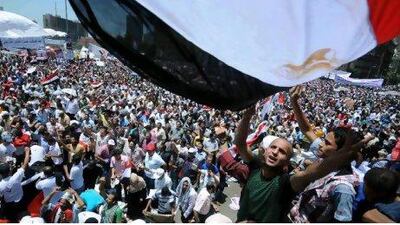CAIRO // By mid-afternoon, Tahrir Square was deafening.
There were men on stages calling for faster trials for ministers associated with the regime. A separate stage featured a speaker chanting anti-Israel phrases. A musician with an amplifier began to sing revolutionary anthems. And then there were the conversations of tens of thousands of people.
"I think we have a big communication problem," said Mohammed Ismail, 24, an employee of the Suez Canal Container Terminal, who travelled three hours yesterday to join the planned protests in Tahrir from his hometown of Port Said.
"I came to demand the trials of the murderers of the martyrs of the revolution, but no one can hear anything. I think everyone in Egypt wants the same thing - freedom and social justice - but we can't communicate."
Whenever emotions ran high, he said, people returned to Tahrir for lack of anywhere else to go or any other means to force change. "There's no parliament," he said. "People don't trust the military, so we come back."
The huge gathering in the square, which has special significance for Egyptians as ground zero of the protests that toppled the presidency, was one of the largest and most diverse since the day Hosni Mubarak stepped down.
Originally billed as a day for groups to demand that the military allow a new constitution to be written before parliamentary elections, a range of groups signed on to the protests in recent days with different demands, including expediting trials of the former regime, reparations for families of victims of the revolution, and reducing the role of the Supreme Council of the Armed Forces in running the country.
The result was a heaving crowd of people with no singleness of purpose, except to express dissatisfaction with the progress made since an 18-day revolution that surprised the country and the world.
"The army have not been doing a good job," said Injy Mohammed, 28, a housewife, who came with her husband to Tahrir. "We think that they have been co-operating with the old regime. How can regular people not have health care, but Mubarak is getting special treatment in Sharm el Sheikh?"
Plans for the protest grew in the last two weeks, especially after violent clashes broke out between several hundred protesters and army riot police near Tahrir Square after some family members of victims of the revolution were refused entry to an event commemorating the death of police officers who died during the uprising. A more than 17-hour protest that escalated to the point where police were lobbing tear gas and young men were throwing rocks. One of their demands was the resignation of the interior minister.
The mood yesterday was peaceful and police were not on the scene, having said they would allow the protest to take place without interference. There were fears of clashes, however, if a planned overnight sit-in took place in the square. The military has violently cleared Tahrir in the past when protesters refused to leave.
Smaller protests were held across the country in solidarity with the groups in Tahrir, including gatherings in Suez for the fourth consecutive day, the southern city of Assiout, and Sharm el Sheikh.
A few blocks away from Tahrir, as the protests were starting, men were listening to a different message from the imam of the Al Fath mosque.
"We must be patient," said Abdallah Darwish, who was giving the Friday sermon. "Our rulers should be given a chance to work and succeed ... Yes, we need justice and quick justice. Slow justice is a type of injustice."
But the real danger to the people of Egypt, he said, were intellectuals who looked down on people across the country and sought to instal a secular government against the will of the nation.
"When the majority say something they don't like, [the intellectuals] change their minds and say these people are not qualified or something was wrong," he said, referring to a referendum vote to amend the constitution that was overwhelmingly approved in March. The vote was a blow to liberal and secular groups that were calling for the writing of a completely new constitution.
"This is what happened with America and Israel when Hamas won the election in Palestine," he said. "They said it's not acceptable. This is the type of democracy we must fear, where the votes of the people do not matter."
bhope@thenational.ae

